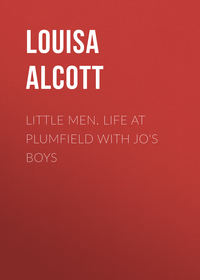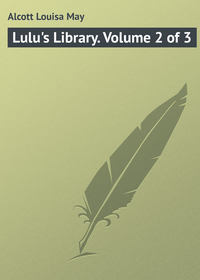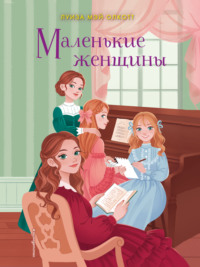 полная версия
полная версияLittle Women: or, Meg, Jo, Beth, and Amy
"What a haughty, uninteresting creature that oldest Miss March is!" was the unfortunately audible remark of one of the ladies, as the door closed upon their guests. Jo laughed noiselessly all through the hall, but Amy looked disgusted at the failure of her instructions, and very naturally laid the blame upon Jo.
"How could you mistake me so? I merely meant you to be properly dignified and composed, and you made yourself a perfect stock and stone. Try to be sociable at the Lambs', gossip as other girls do, and be interested in dress and flirtations and whatever nonsense comes up. They move in the best society, are valuable persons for us to know, and I wouldn't fail to make a good impression there for anything."
"I'll be agreeable; I'll gossip and giggle, and have horrors and raptures over any trifle you like. I rather enjoy this, and now I'll imitate what is called 'a charming girl;' I can do it, for I have May Chester as a model, and I'll improve upon her. See if the Lambs don't say, 'What a lively, nice creature that Jo March is!'"
Amy felt anxious, as well she might, for when Jo turned freakish there was no knowing where she would stop. Amy's face was a study when she saw her sister skim into the next drawing-room, kiss all the young ladies with effusion, beam graciously upon the young gentlemen, and join in the chat with a spirit which amazed the beholder. Amy was taken possession of by Mrs. Lamb, with whom she was a favorite, and forced to hear a long account of Lucretia's last attack, while three delightful young gentlemen hovered near, waiting for a pause when they might rush in and rescue her. So situated, she was powerless to check Jo, who seemed possessed by a spirit of mischief, and talked away as volubly as the old lady. A knot of heads gathered about her, and Amy strained her ears to hear what was going on; for broken sentences filled her with alarm, round eyes and uplifted hands tormented her with curiosity, and frequent peals of laughter made her wild to share the fun. One may imagine her suffering on overhearing fragments of this sort of conversation: —
"She rides splendidly, – who taught her?"
"No one; she used to practise mounting, holding the reins, and sitting straight on an old saddle in a tree. Now she rides anything, for she doesn't know what fear is, and the stable-man lets her have horses cheap, because she trains them to carry ladies so well. She has such a passion for it, I often tell her if everything else fails she can be a horse-breaker, and get her living so."
At this awful speech Amy contained herself with difficulty, for the impression was being given that she was rather a fast young lady, which was her especial aversion. But what could she do? for the old lady was in the middle of her story, and long before it was done Jo was off again, making more droll revelations, and committing still more fearful blunders.
"Yes, Amy was in despair that day, for all the good beasts were gone, and of three left, one was lame, one blind, and the other so balky that you had to put dirt in his mouth before he would start. Nice animal for a pleasure party, wasn't it?"
"Which did she choose?" asked one of the laughing gentlemen, who enjoyed the subject.
"None of them; she heard of a young horse at the farmhouse over the river, and, though a lady had never ridden him, she resolved to try, because he was handsome and spirited. Her struggles were really pathetic; there was no one to bring the horse to the saddle, so she took the saddle to the horse. My dear creature, she actually rowed it over the river, put it on her head, and marched up to the barn to the utter amazement of the old man!"
"Did she ride the horse?"
"Of course she did, and had a capital time. I expected to see her brought home in fragments, but she managed him perfectly, and was the life of the party."
"Well, I call that plucky!" and young Mr. Lamb turned an approving glance upon Amy, wondering what his mother could be saying to make the girl look so red and uncomfortable.
She was still redder and more uncomfortable a moment after, when a sudden turn in the conversation introduced the subject of dress. One of the young ladies asked Jo where she got the pretty drab hat she wore to the picnic; and stupid Jo, instead of mentioning the place where it was bought two years ago, must needs answer, with unnecessary frankness, "Oh, Amy painted it; you can't buy those soft shades, so we paint ours any color we like. It's a great comfort to have an artistic sister."
"Isn't that an original idea?" cried Miss Lamb, who found Jo great fun.
"That's nothing compared to some of her brilliant performances. There's nothing the child can't do. Why, she wanted a pair of blue boots for Sallie's party, so she just painted her soiled white ones the loveliest shade of sky-blue you ever saw, and they looked exactly like satin," added Jo, with an air of pride in her sister's accomplishments that exasperated Amy till she felt that it would be a relief to throw her card-case at her.
"We read a story of yours the other day, and enjoyed it very much," observed the elder Miss Lamb, wishing to compliment the literary lady, who did not look the character just then, it must be confessed.
Any mention of her "works" always had a bad effect upon Jo, who either grew rigid and looked offended, or changed the subject with a brusque remark, as now. "Sorry you could find nothing better to read. I write that rubbish because it sells, and ordinary people like it. Are you going to New York this winter?"
As Miss Lamb had "enjoyed" the story, this speech was not exactly grateful or complimentary. The minute it was made Jo saw her mistake; but, fearing to make the matter worse, suddenly remembered that it was for her to make the first move toward departure, and did so with an abruptness that left three people with half-finished sentences in their mouths.
"Amy, we must go. Good-by, dear; do come and see us; we are pining for a visit. I don't dare to ask you, Mr. Lamb; but if you should come, I don't think I shall have the heart to send you away."
Jo said this with such a droll imitation of May Chester's gushing style that Amy got out of the room as rapidly as possible, feeling a strong desire to laugh and cry at the same time.
"Didn't I do that well?" asked Jo, with a satisfied air, as they walked away.
"Nothing could have been worse," was Amy's crushing reply. "What possessed you to tell those stories about my saddle, and the hats and boots, and all the rest of it?"
"Why, it's funny, and amuses people. They know we are poor, so it's no use pretending that we have grooms, buy three or four hats a season, and have things as easy and fine as they do."
"You needn't go and tell them all our little shifts, and expose our poverty in that perfectly unnecessary way. You haven't a bit of proper pride, and never will learn when to hold your tongue and when to speak," said Amy despairingly.
Poor Jo looked abashed, and silently chafed the end of her nose with the stiff handkerchief, as if performing a penance for her misdemeanors.
"How shall I behave here?" she asked, as they approached the third mansion.
"Just as you please; I wash my hands of you," was Amy's short answer.
"Then I'll enjoy myself. The boys are at home, and we'll have a comfortable time. Goodness knows I need a little change, for elegance has a bad effect upon my constitution," returned Jo gruffly, being disturbed by her failures to suit.
An enthusiastic welcome from three big boys and several pretty children speedily soothed her ruffled feelings; and, leaving Amy to entertain the hostess and Mr. Tudor, who happened to be calling likewise, Jo devoted herself to the young folks, and found the change refreshing. She listened to college stories with deep interest, caressed pointers and poodles without a murmur, agreed heartily that "Tom Brown was a brick," regardless of the improper form of praise; and when one lad proposed a visit to his turtle-tank, she went with an alacrity which caused mamma to smile upon her, as that motherly lady settled the cap which was left in a ruinous condition by filial hugs, bear-like but affectionate, and dearer to her than the most faultless coiffure from the hands of an inspired Frenchwoman.
Leaving her sister to her own devices, Amy proceeded to enjoy herself to her heart's content. Mr. Tudor's uncle had married an English lady who was third cousin to a living lord, and Amy regarded the whole family with great respect; for, in spite of her American birth and breeding, she possessed that reverence for titles which haunts the best of us, – that unacknowledged loyalty to the early faith in kings which set the most democratic nation under the sun in a ferment at the coming of a royal yellow-haired laddie, some years ago, and which still has something to do with the love the young country bears the old, like that of a big son for an imperious little mother, who held him while she could, and let him go with a farewell scolding when he rebelled. But even the satisfaction of talking with a distant connection of the British nobility did not render Amy forgetful of time; and when the proper number of minutes had passed, she reluctantly tore herself from this aristocratic society, and looked about for Jo, fervently hoping that her incorrigible sister would not be found in any position which should bring disgrace upon the name of March.
It might have been worse, but Amy considered it bad; for Jo sat on the grass, with an encampment of boys about her, and a dirty-footed dog reposing on the skirt of her state and festival dress, as she related one of Laurie's pranks to her admiring audience. One small child was poking turtles with Amy's cherished parasol, a second was eating gingerbread over Jo's best bonnet, and a third playing ball with her gloves. But all were enjoying themselves; and when Jo collected her damaged property to go, her escort accompanied her, begging her to come again, "it was such fun to hear about Laurie's larks."
"Capital boys, aren't they? I feel quite young and brisk again after that," said Jo, strolling along with her hands behind her, partly from habit, partly to conceal the bespattered parasol.
"Why do you always avoid Mr. Tudor?" asked Amy, wisely refraining from any comment upon Jo's dilapidated appearance.
"Don't like him; he puts on airs, snubs his sisters, worries his father, and doesn't speak respectfully of his mother. Laurie says he is fast, and I don't consider him a desirable acquaintance; so I let him alone."
"You might treat him civilly, at least. You gave him a cool nod; and just now you bowed and smiled in the politest way to Tommy Chamberlain, whose father keeps a grocery store. If you had just reversed the nod and the bow, it would have been right," said Amy reprovingly.
"No, it wouldn't," returned perverse Jo; "I neither like, respect, nor admire Tudor, though his grandfather's uncle's nephew's niece was third cousin to a lord. Tommy is poor and bashful and good and very clever; I think well of him, and like to show that I do, for he is a gentleman in spite of the brown-paper parcels."
"It's no use trying to argue with you," began Amy.
"Not the least, my dear," interrupted Jo; "so let us look amiable, and drop a card here, as the Kings are evidently out, for which I'm deeply grateful."
The family card-case having done its duty, the girls walked on, and Jo uttered another thanksgiving on reaching the fifth house, and being told that the young ladies were engaged.
"Now let us go home, and never mind Aunt March to-day. We can run down there any time, and it's really a pity to trail through the dust in our best bibs and tuckers, when we are tired and cross."
"Speak for yourself, if you please. Aunt likes to have us pay her the compliment of coming in style, and making a formal call; it's a little thing to do, but it gives her pleasure, and I don't believe it will hurt your things half so much as letting dirty dogs and clumping boys spoil them. Stoop down, and let me take the crumbs off of your bonnet."
"What a good girl you are, Amy!" said Jo, with a repentant glance from her own damaged costume to that of her sister, which was fresh and spotless still. "I wish it was as easy for me to do little things to please people as it is for you. I think of them, but it takes too much time to do them; so I wait for a chance to confer a great favor, and let the small ones slip; but they tell best in the end, I fancy."
Amy smiled, and was mollified at once, saying with a maternal air, —
"Women should learn to be agreeable, particularly poor ones; for they have no other way of repaying the kindnesses they receive. If you'd remember that, and practise it, you'd be better liked than I am, because there is more of you."
"I'm a crotchety old thing, and always shall be, but I'm willing to own that you are right; only it's easier for me to risk my life for a person than to be pleasant to him when I don't feel like it. It's a great misfortune to have such strong likes and dislikes, isn't it?"
"It's a greater not to be able to hide them. I don't mind saying that I don't approve of Tudor any more than you do; but I'm not called upon to tell him so; neither are you, and there is no use in making yourself disagreeable because he is."
"But I think girls ought to show when they disapprove of young men; and how can they do it except by their manners? Preaching does not do any good, as I know to my sorrow, since I've had Teddy to manage; but there are many little ways in which I can influence him without a word, and I say we ought to do it to others if we can."
"Teddy is a remarkable boy, and can't be taken as a sample of other boys," said Amy, in a tone of solemn conviction, which would have convulsed the "remarkable boy," if he had heard it. "If we were belles, or women of wealth and position, we might do something, perhaps; but for us to frown at one set of young gentlemen because we don't approve of them, and smile upon another set because we do, wouldn't have a particle of effect, and we should only be considered odd and puritanical."
"So we are to countenance things and people which we detest, merely because we are not belles and millionaires, are we? That's a nice sort of morality."
"I can't argue about it, I only know that it's the way of the world; and people who set themselves against it only get laughed at for their pains. I don't like reformers, and I hope you will never try to be one."
"I do like them, and I shall be one if I can; for in spite of the laughing, the world would never get on without them. We can't agree about that, for you belong to the old set, and I to the new: you will get on the best, but I shall have the liveliest time of it. I should rather enjoy the brickbats and hooting, I think."
"Well, compose yourself now, and don't worry aunt with your new ideas."
"I'll try not to, but I'm always possessed to burst out with some particularly blunt speech or revolutionary sentiment before her; it's my doom, and I can't help it."
They found Aunt Carrol with the old lady, both absorbed in some very interesting subject; but they dropped it as the girls came in, with a conscious look which betrayed that they had been talking about their nieces. Jo was not in a good humor, and the perverse fit returned; but Amy, who had virtuously done her duty, kept her temper, and pleased everybody, was in a most angelic frame of mind. This amiable spirit was felt at once, and both the aunts "my deared" her affectionately, looking what they afterwards said emphatically, – "That child improves every day."
"Are you going to help about the fair, dear?" asked Mrs. Carrol, as Amy sat down beside her with the confiding air elderly people like so well in the young.
"Yes, aunt. Mrs. Chester asked me if I would, and I offered to tend a table, as I have nothing but my time to give."
"I'm not," put in Jo decidedly. "I hate to be patronized, and the Chesters think it's a great favor to allow us to help with their highly connected fair. I wonder you consented, Amy: they only want you to work."
"I am willing to work: it's for the freedmen as well as the Chesters, and I think it very kind of them to let me share the labor and the fun. Patronage does not trouble me when it is well meant."
"Quite right and proper. I like your grateful spirit, my dear; it's a pleasure to help people who appreciate our efforts: some do not, and that is trying," observed Aunt March, looking over her spectacles at Jo, who sat apart, rocking herself, with a somewhat morose expression.
If Jo had only known what a great happiness was wavering in the balance for one of them, she would have turned dovelike in a minute; but, unfortunately, we don't have windows in our breasts, and cannot see what goes on in the minds of our friends; better for us that we cannot as a general thing, but now and then it would be such a comfort, such a saving of time and temper. By her next speech, Jo deprived herself of several years of pleasure, and received a timely lesson in the art of holding her tongue.
"I don't like favors; they oppress and make me feel like a slave. I'd rather do everything for myself, and be perfectly independent."
"Ahem!" coughed Aunt Carrol softly, with a look at Aunt March.
"I told you so," said Aunt March, with a decided nod to Aunt Carrol.
Mercifully unconscious of what she had done, Jo sat with her nose in the air, and a revolutionary aspect which was anything but inviting.
"Do you speak French, dear?" asked Mrs. Carrol, laying her hand on Amy's.
"Pretty well, thanks to Aunt March, who lets Esther talk to me as often as I like," replied Amy, with a grateful look, which caused the old lady to smile affably.
"How are you about languages?" asked Mrs. Carrol of Jo.
"Don't know a word; I'm very stupid about studying anything; can't bear French, it's such a slippery, silly sort of language," was the brusque reply.
Another look passed between the ladies, and Aunt March said to Amy, "You are quite strong and well, now, dear, I believe? Eyes don't trouble you any more, do they?"
"Not at all, thank you, ma'am. I'm very well, and mean to do great things next winter, so that I may be ready for Rome, whenever that joyful time arrives."
"Good girl! You deserve to go, and I'm sure you will some day," said Aunt March, with an approving pat on the head, as Amy picked up her ball for her.
"Cross-patch, draw the latch,Sit by the fire and spin,"squalled Polly, bending down from his perch on the back of her chair to peep into Jo's face, with such a comical air of impertinent inquiry that it was impossible to help laughing.
"Most observing bird," said the old lady.
"Come and take a walk, my dear?" cried Polly, hopping toward the china-closet, with a look suggestive of lump-sugar.
"Thank you, I will. Come, Amy;" and Jo brought the visit to an end, feeling more strongly than ever that calls did have a bad effect upon her constitution. She shook hands in a gentlemanly manner, but Amy kissed both the aunts, and the girls departed, leaving behind them the impression of shadow and sunshine; which impression caused Aunt March to say, as they vanished, —
"You'd better do it, Mary; I'll supply the money," and Aunt Carrol to reply decidedly, "I certainly will, if her father and mother consent."
XXX
CONSEQUENCES
Mrs. Chester's fair was so very elegant and select that it was considered a great honor by the young ladies of the neighborhood to be invited to take a table, and every one was much interested in the matter. Amy was asked, but Jo was not, which was fortunate for all parties, as her elbows were decidedly akimbo at this period of her life, and it took a good many hard knocks to teach her how to get on easily. The "haughty, uninteresting creature" was let severely alone; but Amy's talent and taste were duly complimented by the offer of the art-table, and she exerted herself to prepare and secure appropriate and valuable contributions to it.
Everything went on smoothly till the day before the fair opened; then there occurred one of the little skirmishes which it is almost impossible to avoid, when some five and twenty women, old and young, with all their private piques and prejudices, try to work together.
May Chester was rather jealous of Amy because the latter was a greater favorite than herself, and, just at this time, several trifling circumstances occurred to increase the feeling. Amy's dainty pen-and-ink work entirely eclipsed May's painted vases, – that was one thorn; then the all-conquering Tudor had danced four times with Amy, at a late party, and only once with May, – that was thorn number two; but the chief grievance that rankled in her soul, and gave her an excuse for her unfriendly conduct, was a rumor which some obliging gossip had whispered to her, that the March girls had made fun of her at the Lambs'. All the blame of this should have fallen upon Jo, for her naughty imitation had been too lifelike to escape detection, and the frolicsome Lambs had permitted the joke to escape. No hint of this had reached the culprits, however, and Amy's dismay can be imagined, when, the very evening before the fair, as she was putting the last touches to her pretty table, Mrs. Chester, who, of course, resented the supposed ridicule of her daughter, said, in a bland tone, but with a cold look, —
"I find, dear, that there is some feeling among the young ladies about my giving this table to any one but my girls. As this is the most prominent, and some say the most attractive table of all, and they are the chief getters-up of the fair, it is thought best for them to take this place. I'm sorry, but I know you are too sincerely interested in the cause to mind a little personal disappointment, and you shall have another table if you like."
Mrs. Chester had fancied beforehand that it would be easy to deliver this little speech; but when the time came, she found it rather difficult to utter it naturally, with Amy's unsuspicious eyes looking straight at her, full of surprise and trouble.
Amy felt that there was something behind this, but could not guess what, and said quietly, feeling hurt, and showing that she did, —
"Perhaps you had rather I took no table at all?"
"Now, my dear, don't have any ill feeling, I beg; it's merely a matter of expediency, you see; my girls will naturally take the lead, and this table is considered their proper place. I think it very appropriate to you, and feel very grateful for your efforts to make it so pretty; but we must give up our private wishes, of course, and I will see that you have a good place elsewhere. Wouldn't you like the flower-table? The little girls undertook it, but they are discouraged. You could make a charming thing of it, and the flower-table is always attractive, you know."
"Especially to gentlemen," added May, with a look which enlightened Amy as to one cause of her sudden fall from favor. She colored angrily, but took no other notice of that girlish sarcasm, and answered, with unexpected amiability, —
"It shall be as you please, Mrs. Chester. I'll give up my place here at once, and attend to the flowers, if you like."
"You can put your own things on your own table, if you prefer," began May, feeling a little conscience-stricken, as she looked at the pretty racks, the painted shells, and quaint illuminations Amy had so carefully made and so gracefully arranged. She meant it kindly, but Amy mistook her meaning, and said quickly, —
"Oh, certainly, if they are in your way;" and sweeping her contributions into her apron, pell-mell, she walked off, feeling that herself and her works of art had been insulted past forgiveness.
"Now she's mad. Oh, dear, I wish I hadn't asked you to speak, mamma," said May, looking disconsolately at the empty spaces on her table.
"Girls' quarrels are soon over," returned her mother, feeling a trifle ashamed of her own part in this one, as well she might.
The little girls hailed Amy and her treasures with delight, which cordial reception somewhat soothed her perturbed spirit, and she fell to work, determined to succeed florally, if she could not artistically. But everything seemed against her: it was late, and she was tired; every one was too busy with their own affairs to help her; and the little girls were only hindrances, for the dears fussed and chattered like so many magpies, making a great deal of confusion in their artless efforts to preserve the most perfect order. The evergreen arch wouldn't stay firm after she got it up, but wiggled and threatened to tumble down on her head when the hanging baskets were filled; her best tile got a splash of water, which left a sepia tear on the Cupid's cheek; she bruised her hands with hammering, and got cold working in a draught, which last affliction filled her with apprehensions for the morrow. Any girl-reader who has suffered like afflictions will sympathize with poor Amy, and wish her well through with her task.









